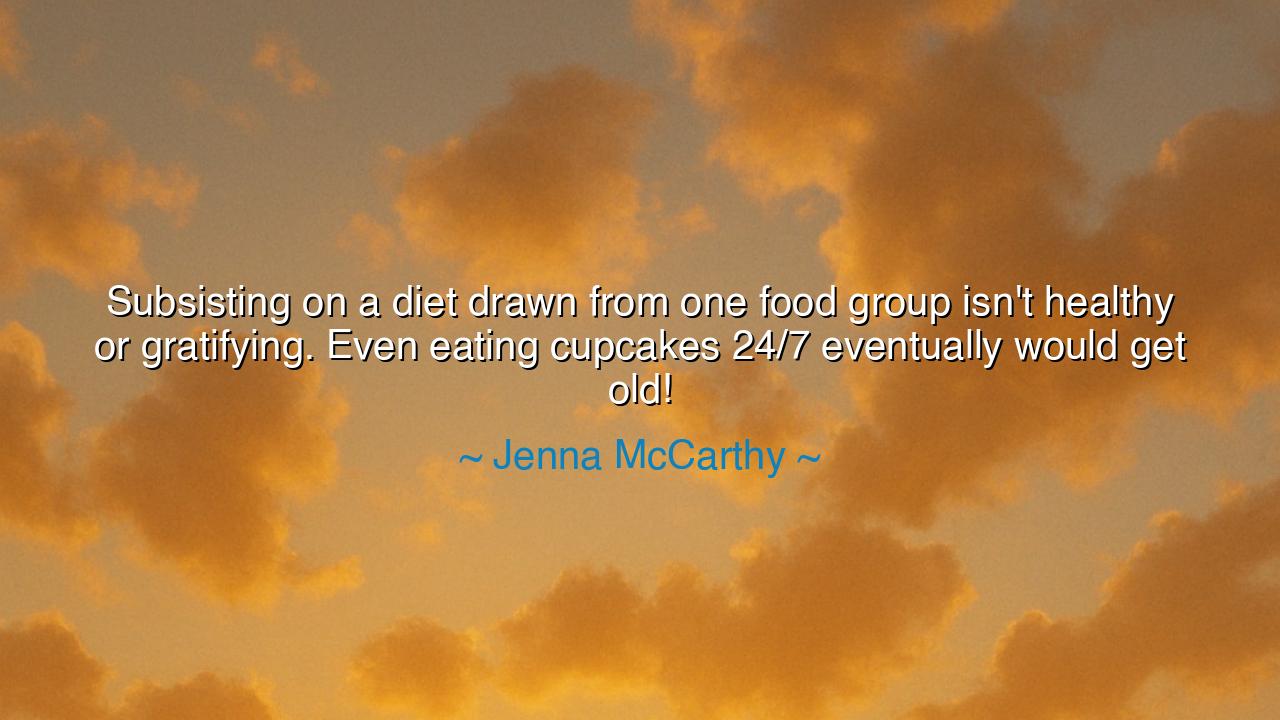
Subsisting on a diet drawn from one food group isn't healthy or
Subsisting on a diet drawn from one food group isn't healthy or gratifying. Even eating cupcakes 24/7 eventually would get old!






When Jenna McCarthy declared, “Subsisting on a diet drawn from one food group isn’t healthy or gratifying. Even eating cupcakes 24/7 eventually would get old!” she was not merely speaking about food—she was speaking about life itself. Her words, light with humor yet heavy with truth, unveil the ancient principle of balance, that sacred harmony which governs both the body and the soul. To feed oneself from only one source—whether in diet, in thought, or in desire—is to starve the spirit of diversity, to wither amidst abundance. Even sweetness, when consumed without measure, turns bitter upon the tongue.
The ancients knew this truth well. The philosopher Aristotle called it the golden mean, the path between excess and deficiency. To live in balance was not weakness, but mastery. Just as the earth yields grain, fruit, and root to sustain the body, so must a wise person draw from many sources to sustain the heart. McCarthy’s playful vision of eating cupcakes 24/7 serves as a mirror for all forms of indulgence: what begins as pleasure, untempered by moderation, soon becomes poison. The sweetness of life must be savored, not devoured.
Consider the tale of King Midas, who wished that all he touched would turn to gold. His wish was granted, and soon he found himself surrounded by the gleam of his own desire—unable to eat, unable to embrace, unable to live. What he loved most became his prison. In the same way, McCarthy warns us that variety is the essence of vitality, and that even joy, when consumed without contrast, loses its meaning. Without darkness, there is no appreciation of light; without hunger, no pleasure in the feast.
Her wisdom extends beyond the realm of the plate. For the “one food group” she speaks of symbolizes the narrowness of modern life—how we often confine ourselves to comfort, routine, or single pursuits. The artist who paints only one subject, the worker who lives only for labor, the soul who seeks only pleasure—all suffer the same quiet malnutrition of spirit. To thrive, one must taste broadly of life’s offerings: friendship and solitude, action and rest, success and humility. Only in diversity does the soul remain whole.
In the teachings of Eastern philosophy, the body and mind are reflections of nature’s balance—yin and yang, giving and receiving, light and shade. To eat only one flavor, to dwell only in one emotion, is to defy this rhythm. McCarthy’s humor conceals the sacred law that pleasure without pause is emptiness. Even the gods of Olympus, with all their power and indulgence, craved the variety of mortal experience. They envied man’s ability to feel hunger, to dream, to change.
And yet, there is tenderness in her message. She does not condemn the cupcake; she celebrates it, while reminding us that its sweetness finds meaning only when balanced with other flavors. This is not a call to abstinence, but to wholeness. Life’s joy comes not from one note struck loudly, but from the melody of many tones in harmony. In food, in work, in love—seek not the singular, but the symphony.
Let this, then, be the lesson: the body grows strong through varied nourishment, and the soul through varied experience. To live well is to partake of life’s banquet with gratitude, tasting from every platter without gluttony or fear. For as Jenna McCarthy reminds us, even endless delight grows dull without change. So eat with balance, live with curiosity, and remember—the sweetest moments are those that come between hunger and fulfillment, where the palate and the heart are both still open to wonder.






AAdministratorAdministrator
Welcome, honored guests. Please leave a comment, we will respond soon